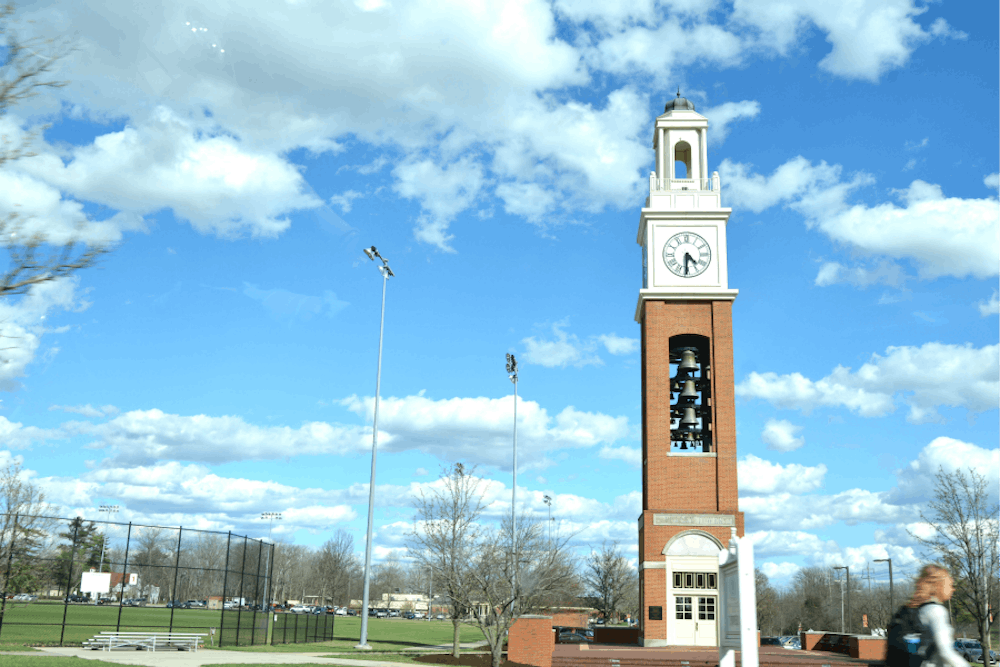By Angela Hatcher, News Editor
Miami University is hosting its 15th annual Lavender Graduation Saturday, May 7 at noon in the Sesquicentennial Chapel followed by a reception in MacMillan Hall 212 at 1 p.m. The theme this year is "15 Years of Celebrating You."
"This year's theme ... is really hitting back on the fact that Lav Grad is about honoring the wholeness and complexities and the beauty of our students," said Shevonne Nelson, assistant director and coordinator of GLBTQ+ Services.
Lavender Graduation is an annual ceremony conducted on college campuses to honor lesbian, gay, bisexual, transgender and ally students and to acknowledge their achievements and contributions to the school.
Created by Dr. Ronni Sanlo, a Jewish lesbian, after she was denied the opportunity to attend the graduations of her biological children because of her sexual orientation, Sanlo encouraged the dean of students at the University of Michigan to start the program. Sanlo designed the first Lavender Graduation ceremony in 1995.
By 2001, there were over 45 Lavender Graduation ceremonies at colleges and universities nationwide, including Miami University.
The 1809 LGBT alumni association started Lavender Graduation at Miami in 2001 to celebrate, acknowledge and give a voice to GLBTQ+ students.
" ... We're able to acknowledge students for exactly who they are in the way that they want to be acknowledged," said Nelson. "Which is not always the case in the traditional university ceremony."
For example, Nelson said, if a student wants to be referred to by a different name, if someone's participation in the GLBTQ+ community wasn't public, or if a graduate wants to wear something unconventional, they get to celebrate exactly who they are at the Lavender Graduation ceremony.
Unlike regular graduation ceremonies, students who participate in Lavender Graduation have someone provide words about them, roughly three to five minutes about who they are and what they've done at Miami.
"We really get to know them as individuals and celebrate them as individuals which is a little bit different than when you have 2,000 to 3,000 people graduate," said Nelson.
For the Lavender Graduation ceremony, students do not have to identify within the LGBTQ+ community in order to participate.
Enjoy what you're reading?
Signup for our newsletter
"If you're willing to be here, we're willing to have you. As long as we can be us simultaneously," said Nelson.
Allies, or people who actively support members of the GLBTQ+ community, have graduated from Lavender Graduation in previous years.
For Nelson, it comes down to the institution celebrating and acknowledging the GLBTQ+ students for who they are, rather than using their identities and orientations as an educational platform.
"If you're not there to really celebrate these folks, it's not the right space for you. It's not meant to be an educational space," said Nelson.
Nelson said that participating in the ceremony can be a healing experience for students.
"I would say Miami has been hurtful for folks, so if the only thing you get is three hours on one Saturday a week before to heal the hurt and provide an apology to the campus, it is incredibly important to do that on this campus," said Nelson. "It was necessary, the only place where people could completely show up and feel safe in ways that didn't exist on campus."
While the GLBTQ+ community on campus has made significant progress on campus with gender neutral housing, the relabeling of bathrooms and the implementation of preferred pronoun education, Nelson emphasized how essential it is to give the individuals in this community the space they need to feel comfortable and celebrated, especially on their graduation.
First year French and French education major Lauren Racela described the essence and purpose of Lavender Graduation.
"This is a place where no one has to explain themselves," Racela said.




